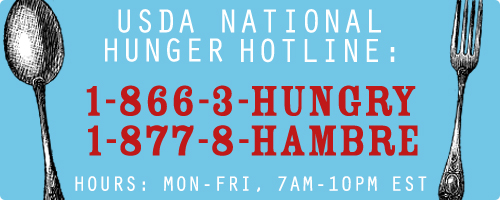 Last week, school leaders from around the state participated in our webinar on Community Eligibility as a tool for combating child hunger in schools. We were thrilled to be able to bring them this important information…but the work is not done!
Last week, school leaders from around the state participated in our webinar on Community Eligibility as a tool for combating child hunger in schools. We were thrilled to be able to bring them this important information…but the work is not done!
More than 550 high-poverty schools in South Carolina are eligible to use this powerful new tool to combat hunger in their schools. This tool increases the number of children eating school meals and reduces paperwork by providing school meals to all students free of charge this upcoming school year. With 1 in 5 children going hungry each day in our state, we can’t let this opportunity slip by!
Schools must OPT IN by August 31, 2014!
SC Appleseed is at work helping Superintendents, Principals and other school leaders in South Carolina understand what community eligibility (CEP) is, how it could impact their schools, and why it is critical for them to enroll! On June 12th, over 100 school leaders in South Carolina participated in our webinar on Community Eligibility. We were thrilled to be able to bring them this important information and answer their questions…but the work is not done!
Why Community Eligibility?
Initial results from across the nation show that CEP has led to a 25% increase in breakfast participation and 13% increase in lunch participation in eligible schools. In addition to the negative impact that hunger has on overall growth and health, children who struggle with hunger also have to cope with its effects on their success at school. To learn about the effects of childhood hunger, read more on our blog.
Reaching out to School Leaders:
With help from the Center on Budget and Policy Priorities, we were able to host a free webinar for school leaders across the state to learn about this important tool and how their decision to opt in would:
- ensure more of their students are receiving proper nutrition
- decrease paperwork for their schools
- increase the likelihood of success for their students.
We had over 100 people tune into the webinar and are excited to provide not only a recording of the training, but also additional information to help South Carolina schools know what Community Eligibility is and who to contact for help.
This webinar can be viewed on youtube:
Slides from the webinar can also be accessed here: Community Eligibility Info for SC Schools, Districts, Parents & Teachers
A number of useful references were mentioned during the webinar, many of which are available on USDA’s community eligibility web page. Useful materials from states that have implemented community eligibility are available on the Food Research and Action Center’s web site.
- USDA’s reimbursement estimating tool [link forthcoming]
- US Department of Education’s Title I Guidance
- Letter from Secretaries of Agriculture and Education highlighting the benefits of participating in CEP
- Center on Budget and Policy Priorities’ Summary of Title I Guidance
- Center on Budget and Policy Priorities’ and Food Research and Action Center’s Policy Brief on Alternatives to School Meal Applications [link forthcoming]
- Federal Communication Commission’s E-rate Guidance
South Carolina Department of Education staff are available to assist you. If you have questions, please contact the appropriate individual.
Community Eligibility Provision and School Meals
Juanita Bowens, Child Nutrition Director
[email protected]
803.734.8205
State Funding Formula
Mellanie Jinnette, Chief Financial Officer
[email protected]
803.734.3605
Title I
Roy Stehle, Director Federal and State Accountability
[email protected]
803.734.8188
It is our hope that all eligible SC schools will take advantage of this important opportunity.
It’s a WIN-WIN for the school and it could change the future for a child.
YOU CAN HELP:
Are you a teacher or school official in South Carolina? Share this information with your district!
Do you have questions about how CEP could impact your school? Let us know.
Are you a parent and would like to see your child’s school opt-in? Share this information with the school administrators and urge them to opt in.
To receive updates on our policy work to combat hunger and improve educational opportunities for all in South Carolina, sign up to be on our e-alert list for hunger and education issues.
We believe this is an exciting opportunity that schools in our state should seize.
Adopting the Community Eligibility Provision (CEP) can provide significant benefits not only to South Carolina’s high-poverty schools, but also to the many students they serve who might otherwise struggle to get enough food to eat each day.



